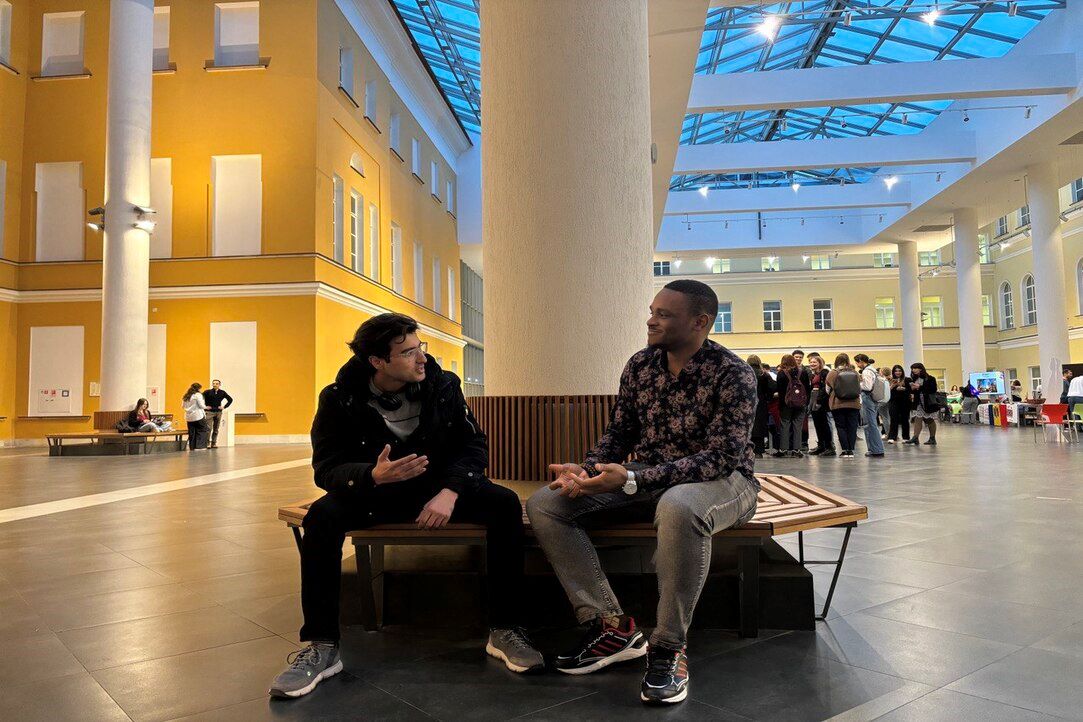Empowering International Student Voices

I am Collins Ogudu, a second year master's student who studies Foreign Languages and Intercultural Communications at the Higher School of Economics, Moscow. Today we woll talk to the president of the Council of International Students Association (CISA) of the Higher School of Economics.
My name is Muhammad Sarim Jalal, and I hail from a South Asian country known as Pakistan. This is my first year here at HSE - Higher School of Economics, and I am a first-year Master's student pursuing a degree program in Business Analytics and Big Data Systems at the Graduate School of Business. Right now, I am also serving as the President of the Council of International Students’ Association, which is an authorized student body for international students at the Higher School of Economics.
The University stands as one of the most prestigious institutes available, and I feel immensely proud to be a part of this multicultural, multiethnic university. Not only is HSE well-known in Russia, but it also enjoys a strong reputation globally. It boasts a student population of more than fifty thousand, with almost ten to fifteen percent being international students. I am always proud to be associated with this university.
This appointment has been particularly interesting for me, given my prior experience in similar activities during my bachelor’s program at my previous university. To give you some context, my previous university had a total student population of nine thousand. In such an environment, students were responsible for managing their social, extracurricular, and academic lives, creating a vibrant university atmosphere. However, here at HSE, with over five thousand international students, their participation in university life, especially in extracurricular activities, is relatively low. It's crucial for me to address this issue during my tenure. Active involvement in extracurricular and socio-cultural activities fosters interaction among students, which, in turn, helps alleviate various challenges they may face. By encouraging greater participation, we can enhance the overall student experience and inform university policies that cater to the needs of all students.
The solution lies in leveraging existing support structures within HSE. We have dedicated departments and student councils equipped to assist students with various challenges. It's essential for students to realize that they have representation within the university and that their concerns will be heard. While language barriers may pose challenges, initiatives like the Council of International Students’ Association (CISA) provide a comfortable platform for international students to seek assistance. By promoting awareness of such resources, we can effectively address documentation and administrative hurdles.
The university functions as a nexus between students and administration, with student councils bridging communication gaps. At HSE, diversity and inclusion are already ingrained, given the institution's internationalized nature and English as the official mode of communication. However, there's always room for improvement. By facilitating greater interaction among students and providing platforms for cultural exchange, we can enhance inclusivity. Moreover, initiatives like CISA serve as advocates for international students, ensuring their perspectives are considered in decision-making processes.
The university offers dedicated support services, including trained psychologists, to cater to students' emotional and psychological needs. Additionally, student councils like CISA provide a platform for students to seek assistance and connect with peers. Cultural differences, while challenging, offer opportunities for personal growth and development. By embracing cultural diversity and fostering a sense of community, we can alleviate feelings of isolation and promote overall well-being among international students.
HSE offers various scholarship opportunities and financial aid programs to support students. The recent expansion of scholarship spots by the Russian government further enhances these opportunities. Additionally, initiatives like the extended scholarship program and financial aid office provide avenues for students to access support based on their individual circumstances. Furthermore, exchange programs and funding opportunities offered by faculties incentivize academic excellence and provide additional financial support for deserving students.
While we may not have the authority to change policies, we can provide students with information and guidance to navigate these challenges. By collaborating with relevant departments and organizations, we can ensure that students receive the support they need during uncertain times. It's essential to emphasize that the university prioritizes student welfare and is committed to providing assistance wherever possible.
While travel restrictions and remote learning pose challenges, it's essential to remain resilient and adaptable. HSE is committed to providing support and resources to help students overcome these challenges. Initiatives like the mail payment system and student support services enable students to access essential services and resources, regardless of their location. By fostering a supportive and inclusive environment, we can navigate these difficulties together and emerge stronger as a community.
Accountability is a core value of our organization, and we are committed to ensuring transparency and effectiveness in all our initiatives. By setting clear goals and objectives, we can track progress and assess the impact of our efforts. Additionally, we welcome feedback from students and stakeholders to continuously improve and refine our approach. Through collaboration and communication, we can uphold our commitment to serving the needs of the student body and promoting a vibrant and inclusive campus community.
Thank you, Collins. It's been a pleasure discussing these important issues with you. I look forward to continuing our work together to support international students at HSE.
Interview by

